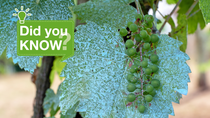Agriculture
Did You Know Even Organic Farmers Can Use Pesticides?

Like many farmers, organic farmers use a variety of ways to prevent pests, weeds and diseases damaging or destroying their crops. These include use of resistant varieties, cultural practices such as crop rotation and mechanical weeding. However, sometimes these are not sufficient, so organic farmers use pesticides which are approved for use in organic agriculture [1].
These include "basic substances" such as vinegar, "low risk substances" such as ferric phosphate, microorganisms, pheromones, as well as other pesticides such as sulphur, copper, plant extracts* and synthetic insecticides**.
Not having access to modern alternatives, fungicides based on copper‡ remain especially important for organic farmers (limited by EU law to 28 kg of copper per hectare over a period of 7 years).
* E.g. Pyrethrins
** Deltamethrin and lambda-cyhalothrin (pyrethroid insecticides) used in insect traps to control olive pests.
‡ Copper hydroxide, Copper oxychloride, Copper oxide, Bordeaux mixture, and Tribasic copper sulphate
[1] Commission implementing regulation EU (EU) 2021/1165 of 15 July 2021 authorising certain products and substances for use in organic production and establishing their list (Official Journal of the European Union)